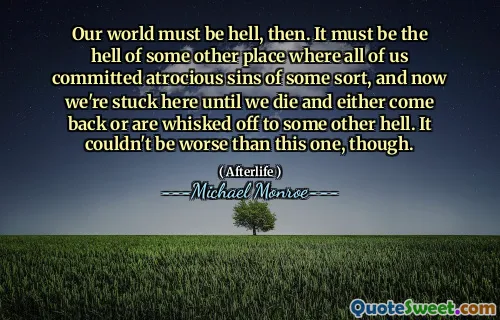
Our world must be hell, then. It must be the hell of some other place where all of us committed atrocious sins of some sort, and now we're stuck here until we die and either come back or are whisked off to some other hell. It couldn't be worse than this one, though.
This quote offers a stark and introspective view of human existence and the idea of suffering as an intrinsic aspect of life. It suggests that our current world might be a form of hell—an earthly reflection of spiritual punishment or a consequence of collective sins. The notion that the world may be a place where souls are trapped, awaiting either rebirth or eternal damnation, resonates with many religious and philosophical concepts of consequence, karma, or the afterlife. It evokes a sense of despair and hopelessness, emphasizing the enduring nature of human suffering.
The meditation on sins and punishment hints at a moral universe where our actions have profound consequences, possibly in this life or beyond. It raises questions about justice, redemption, and the inherent flaws of human existence. The phrase that it 'couldn't be worse than this one' emphasizes a profound dissatisfaction with the current state, implying that any alternative—be it reincarnation or another form of afterlife—might offer hope or relief. However, the bleak tone also fosters reflection on the necessity of confronting suffering and the importance of seeking meaning or redemption.
Overall, the quote encapsulates existential themes—our struggles, moral weight, and the hope for transcendence. It challenges us to consider the nature of suffering and whether our current reality is a test, punishment, or simply the human condition that must be endured. It underscores a deep-seated desire for meaning amidst despair, prompting readers to reflect on what lies beyond and how to find purpose in a seemingly intolerable world.






